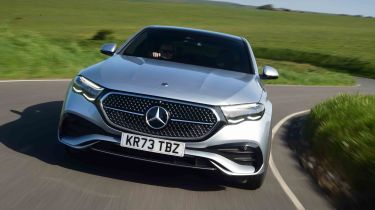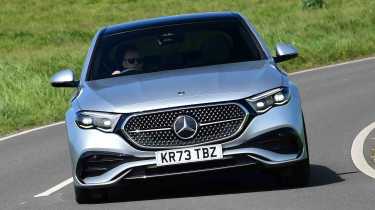Mercedes E-Class - Engines, performance & drive
The Mercedes E-Class is fantastic for comfort and refinement, and it’s a superb motorway cruiser, too

The engine range in the Mercedes E-Class begins with the E 200 petrol. It’s a mild hybrid, four-cylinder motor with 201bhp (plus a little tiny electric helper motor as part of the mild hybrid system). It’s torquey, with 320Nm, and gets from 0-62mph in 7.5 seconds, so despite being the cheapest model, it’s still a good option for most people.
The E 220 d is a better fit for this type of car as it’s excellent for keeping fuel economy high while taking long motorway trips. It’s only a little less powerful than the petrol, with 194bhp but it has more torque - 440Nm - so it feels a bit more muscular when you put your foot down despite the slightly slower 0-62mph time of 7.6s.
The next rung up on the ladder is the E 300 e. It’s a plug-in rather than a mild hybrid like the E 200 and E 220 d, using a four-cylinder petrol engine that’s mated to an electric motor to boost total power to 309bhp. Thanks to its extra power, the 0-62mph time is over a second quicker than the E 200 (6.4 seconds). Plus, you get 70 miles of driving on electric power only, which is really impressive.
Used - available now

2020 Mercedes
E Class
56,910 milesAutomaticDiesel2.0L
Cash £22,700
2018 Mercedes
E Class
44,929 milesAutomaticDiesel3.0L
Cash £20,806
2022 Mercedes
E Class
46,558 milesAutomaticPetrol2.0L
Cash £26,400
2022 Mercedes
E Class
35,714 milesAutomaticDiesel2.0L
Cash £25,800The E 300 de also takes 6.4 seconds to get from 0-62mph. It uses the same-sized battery, so the electric range is about the same, and the total power is the same at 309bhp. The only difference is that it uses a diesel engine, which will be more efficient than the petrol engine in the E 300 e when you have to use the engine after the battery has been used up.
The E 450 d is the most expensive non-AMG model in the E-Class range. The six-cylinder diesel engine has mild hybrid technology to provide some electrical assistance to improve fuel economy and emissions, and provide a small performance boost when accelerating. With 362bhp, the E 450 d is a powerful car with more than enough power to get from 0 to 62 mph in a short 4.8 seconds. All that performance gets to the ground through a standard four-wheel drive system.
At the top of the range is the Mercedes-AMG E 53 Hybrid 4Matic+. It’s the replacement for the old E 63 models but, controversially, does away with a thundering V8 engine for a six-cylinder petrol engine and an electric motor. The combined power output is 577bhp and 750Nm of torque, so it’s clearly a match for the old V8 when it comes to power, but car fans will likely miss the old car’s characterful engine.
All cars use a nine-speed automatic gearbox, although the AMG model has different software that's tuned more for performance.
|
Model |
Power |
0-62mph |
Top speed |
|
E 220 d |
194bhp |
7.6s |
148mph |
|
E 300 e |
309bhp |
6.4s |
147mph |
|
E 450 d |
362bhp |
4.8s |
155mph |
What is the Mercedes E-Class like to drive?
In town
The Mercedes E-Class is a large car, so it will never be as relaxing to drive as a smaller city car through narrow streets. However, it’s incredibly quiet at low speeds, especially in hybrid models that can drive using near-silent electric power without waking the engine.
The suspension is fantastic at masking bumps and potholes, plus the automatic gearbox is smooth in traffic. So as long as you don’t need to park in a tight car park, the E-Class is excellent around town.
On A- and B-roads
The Mercedes E-Class is competent on twisty roads, but the BMW 5 Series is nicer to drive. The E-Class feels heavy, and the brakes of plug-in hybrid models, while effective, don’t give you the same confidence as the 5 Series and have an inconsistent pedal feel. The steering is numb - like many cars in this class - but light and quite quick, which can cause the car to feel a bit unsettled as you turn into bends.
There’s more body roll than a 5 Series in tight corners, but things improve once on an open A-road. The suspension in the E-Class smoothes out bumps very well (even in models with large alloy wheels and not much tyre sidewall). It does a fantastic job of providing a comfortable feel without jostling you and your passengers when travelling along a bumpy road.
On the motorway
The E-Class excels on the motorway. Its smooth suspension and powerful engines make it effortless to spend time here, while the low-drag bodywork keeps wind noise low and economy high. The diesel engine in the E 220 d is a little noisy under hard acceleration, but overall refinement is superb, and you could hardly hear the engine in the E 300 e model we tested.
Engines, 0-60 acceleration and top speed
The E-Class engine range has strong performance across the board. The E 200 petrol manages 0-62mph in 7.5 seconds, while the E 220 d does the same in 7.6 seconds. The top speeds of 149 and 148mph, respectively, reflect their home-country usage on the Autobahn; they’re great as high-speed cruisers despite being entry-level cars.
The E 450 d is the fastest non-hybrid in the range, and takes 4.8 seconds to go from 0-62mph. It can hit a limited top speed of 155mph.
The E 300 e and E 300 de are the economy-focused hybrids in the E-Class range, and can go from 0 to 62mph in 6.4 seconds. The petrol E 300 e has a top speed of 147mph, and the diesel E 300 de tops out at 146mph.
The high-performance Mercedes-AMG goes from 0-62mph in just four seconds and has a limited top speed of 155mph.
More reviews
Car group tests
In-depth reviews
Road tests
Used car tests
Which Is Best
Fastest
- NameE450d 4M AMG Line Premium 4dr 9G-Tronic [Pan Roof]
- Gearbox typeSemi-auto
- RRP£79,870









